
William Broderick Crawford was an American actor. He is best known for his portrayal of Willie Stark in the film All the King's Men (1949), which earned him an Academy Award and a Golden Globe Award. Often cast in tough-guy or slob roles, he later achieved recognition for his starring role as Dan Mathews in the crime television series Highway Patrol (1955–1959).
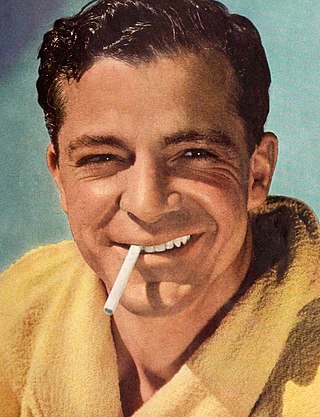
Carver Dana Andrews was an American film actor who became a major star in what is now known as film noir. A leading man during the 1940s, he continued acting in less prestigious roles and character parts into the 1980s. He is best known for his portrayal of obsessed police detective Mark McPherson in the noir Laura (1944) and his critically acclaimed performance as World War II veteran Fred Derry in The Best Years of Our Lives (1946).
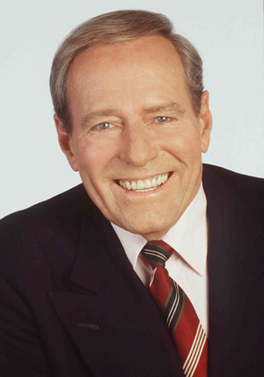
Philip Carey was an American actor, well-known for playing the role of Asa Buchanan on the soap opera One Life to Live for nearly three decades.

Bold Venture was a syndicated radio series starring Humphrey Bogart and Lauren Bacall that aired from 1951 to 1952. Morton Fine and David Friedkin scripted the taped series for Bogart's Santana Productions.

Mr. District Attorney is a radio crime drama produced by Samuel Bischoff that aired on NBC and ABC from April 3, 1939 to June 13, 1952. The series focused on a crusading district attorney initially known only as Mister District Attorney or Chief, and was later translated to television. On television, the attorney's name was Paul Garrett, and the radio version adopted the name in its final years when David Brian played the role. A key figure in the dramas was secretary Edith Miller.
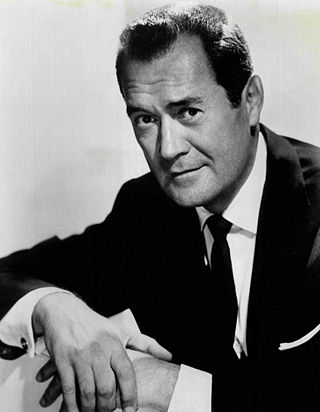
Frank Andrew Lovejoy Jr. was an American actor in radio, film, and television. He is perhaps best remembered for appearing in the film noir The Hitch-Hiker and for starring in the radio drama Night Beat.
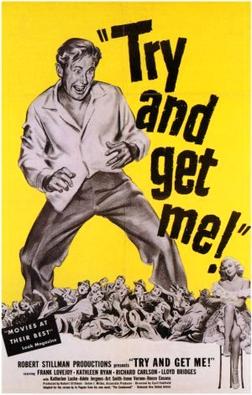
The Sound of Fury is a 1950 American crime film noir directed by Cy Endfield and starring Frank Lovejoy, Kathleen Ryan, Richard Carlson. The film is based on the 1947 novel The Condemned by Jo Pagano, who also wrote the screenplay.

The Sniper is a 1952 American film noir, directed by Edward Dmytryk, written by Harry Brown and based on a story by Edna and Edward Anhalt. The film features Adolphe Menjou, Arthur Franz, Gerald Mohr and Marie Windsor.

John Richard Webb was an American film, television and radio actor.

I Led 3 Lives is an American drama series syndicated by Ziv Television Programs from October 1, 1953, to January 1, 1956. The series stars Richard Carlson. The show was a companion piece of sorts to the radio drama I Was a Communist for the FBI, which dealt with a similar subject and was also syndicated by Ziv from 1952 to 1954.
Matthew Cvetic was a Pittsburgh native who was a spy and informant working for the Federal Bureau of Investigation inside the Communist Party of the United States (CPUSA) during the 1940s. He told his story in a series in the Saturday Evening Post, and his experiences were then fictionalized in the old time radio show I Was a Communist for the FBI, adapted for a Warner Brothers motion picture in 1951. He testified before the House Un-American Activities Committee in the 1950s.
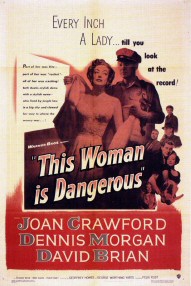
This Woman Is Dangerous is a 1952 American film noir and crime drama by Warner Bros. starring Joan Crawford, David Brian, and Dennis Morgan in a story about a gun moll's romances with two different men against the background of her impending blindness. The screenplay by Geoffrey Homes and George Worthing Yates was based on a story by Bernard Girard. The film was directed by Felix E. Feist and produced by Robert Sisk.

Goodbye, My Fancy is a 1951 American romantic comedy film starring Joan Crawford, Robert Young, and Frank Lovejoy. The film was directed by Vincent Sherman and produced by Henry Blanke. Distributed by Warner Bros., the film was based on the 1948 play of same name by Fay Kanin and adapted for the screen by Ivan Goff and Ben Roberts. Reinforcing social changes brought on by World War II and movies portraying women as successful on their own, such as 1945's Academy Award-winning Mildred Pierce, the plot follows an influential Congresswoman who returns to her former college to receive an honorary degree only to find her old flame as the university president.
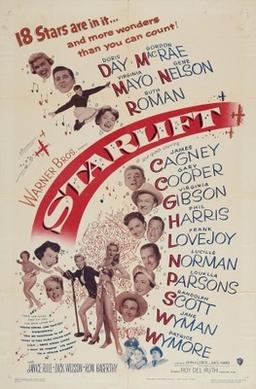
Starlift is a 1951 American musical film released by Warner Bros. starring Doris Day, Gordon MacRae, Virginia Mayo, Dick Wesson, and Ruth Roman. It was directed by Roy Del Ruth and written by John D. Klorer and Karl Kamb, from a story by Klorer. The film was made during the beginning of the Korean War and centers on a U.S. Air Force flyer's wish to meet a film star, and her fellow stars' efforts to perform for injured men at the air force base.
Gang Busters is an American dramatic radio program heralded as "the only national program that brings you authentic police case histories." It premiered on January 15, 1936, and was broadcast over 21 years through November 27, 1957.

Walk a Crooked Mile is a 1948 America anti-communist, Cold War crime film, directed by Gordon Douglas, starring Dennis O'Keefe and Louis Hayward.
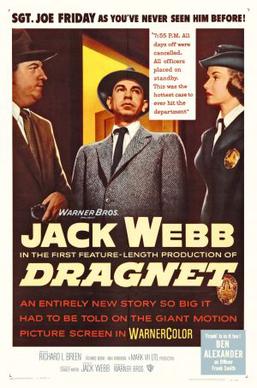
Dragnet is a 1954 American crime film directed by Jack Webb and written by Richard L. Breen. The film stars Webb, Ben Alexander, Richard Boone, Ann Robinson, Stacy Harris, Virginia Gregg and Vic Perrin. The film was adapted from the radio series of the same name, and is part of the wider Dragnet media franchise. The film was released by Warner Bros. on September 4, 1954.

Francis M. Gerstle was an American character actor who appeared in supporting roles in numerous films, radio programs and TV shows following World War II.

William Albertson was a 20th-century American leader in the Communist Party of the USA who battled federal and state courts, and who in 1964 was framed by the Federal Bureau of Investigation, which was only discovered posthumously in 1975. His widow made an out-of-court settlement in 1989 with the U.S. Government for $170,000.

Ronald F. Hagerthy is an American actor on television and in films.


















